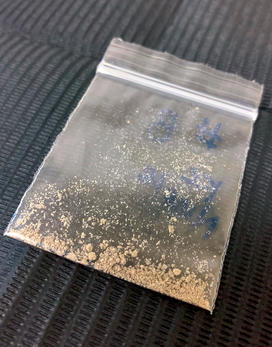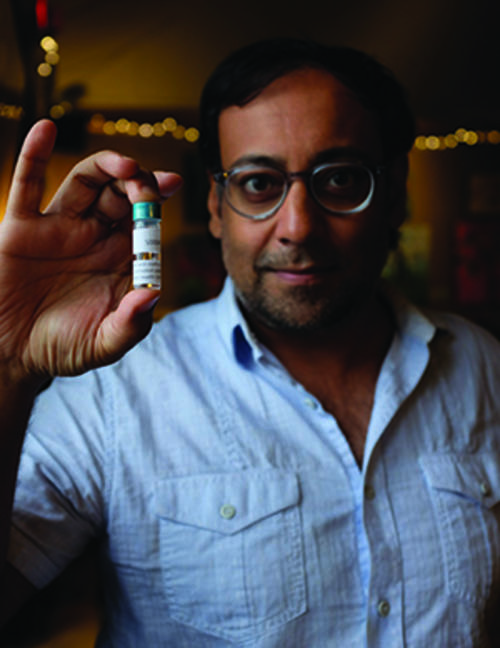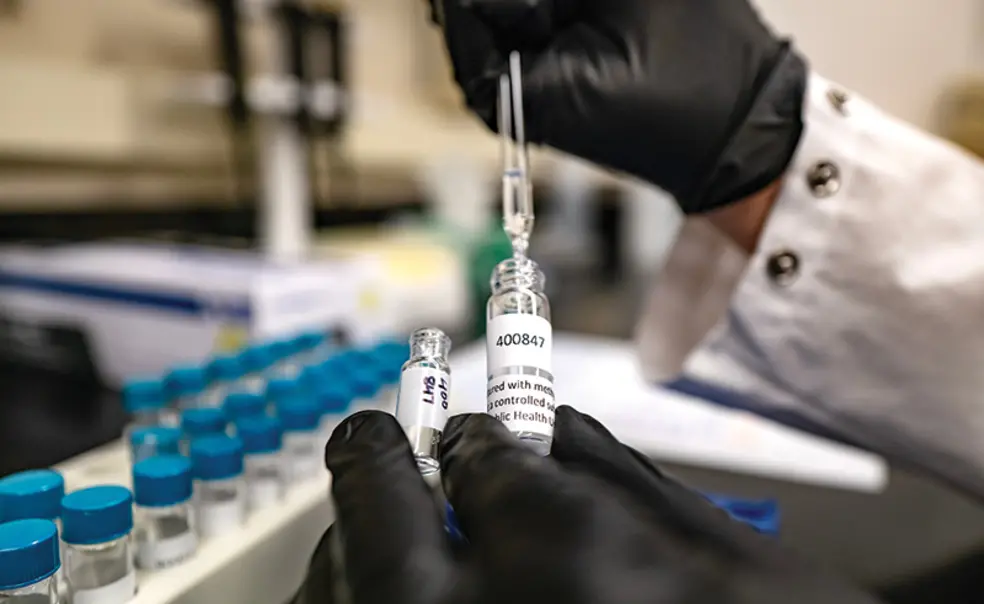Nabarun Dasgupta ’00 Is Testing Street Drugs to Prevent Overdoses
Dasgupta also started a nonprofit that is now the country’s largest distributor of naloxone
The summer after he graduated from Princeton Nabarun Dasgupta ’00 worked in a cardboard box factory near his hometown in Maine. What he learned there would unexpectedly influence the rest of his career.
“I found out there was a time you didn’t go into the bathroom because my co-workers were crushing OxyContin into lines and sharing it in there,” he recalls. The workers weren’t using the pain medication to get high. “These men had been working there for decades, and they didn’t have health insurance. This was the pain relief they needed to get through the day and provide for their families.” The experience taught Dasgupta that “pain and addiction was much more nuanced and vivid than what I read in science journals.”
After spending the following summer interviewing people using OxyContin, he wrote his master’s thesis at Yale about abuse of the medication. When it was published in 2003, it was the second study ever released about the subject.

Dasgupta is an applied epidemiologist at the University of North Carolina (UNC) at Chapel Hill, where, in addition to studying drugs and infectious diseases, he oversees the UNC Street Drug Analysis Lab, a program that tests street drugs. Drug users, medical facilities, and harm reduction community groups anonymously mail samples of street drugs to the lab, which tests them and posts the results on a website accessible to anyone, to let users know what the samples contain.
“We give people information about what’s in street drugs so they can make better decisions about what they put in their body,” he says. Knowing a sample is laced with fentanyl, which has caused many overdose deaths in recent years, may prompt users “to choose to use less, find a different source, throw it away, or go into treatment,” says Dasgupta, who visits harm reduction programs throughout the country several times a year.
Drug checking has been conducted for many years in Europe and other parts of the world, but it is relatively new in the United States. So far, the UNC program has analyzed more than 2,000 samples.
“Analysis shows [naloxone] doesn’t increase drug use; it leads to people going into treatment, and at the end of the day, it keeps people alive.”
— Nabarun Dasgupta ’00
To those who would criticize his work as enabling drug use, Dasgupta says, “In the past, we only found out what was in street drugs when it was too late — when people were arrested or when they were dead. If the goal is prevention, we need information sooner and provided directly to individuals making choices about what to put in their bodies.” He points out that with 100,000 overdose deaths a year, the country is “clearly not doing well with the way we are doing things.”

Dasgupta also started a nonprofit called Remedy Alliance/For the People that is now the largest distributor in the country of naloxone, the generic name for Narcan, which reverses opioid overdoses. Since its launch last year, the nonprofit has provided more than a million doses of low-cost naloxone to community groups. Those organizations offer the medication to people who use drugs because “they are there when an overdose happens, and they can reverse it themselves,” Dasgupta says. “Analysis shows it doesn’t increase drug use; it leads to people going into treatment, and at the end of the day, it keeps people alive.”
As a Princeton student, Dasgupta thought his path to helping others would entail becoming a doctor. But during his sophomore year, he took three laboratory courses and ended up failing physics and organic chemistry. “Being an immigrant, I felt a lot of pressure to become a doctor,” says Dasgupta, who was born in India and moved to the United States as a baby. After taking a required semester off and retaking the classes, Dasgupta returned to Princeton and completed his molecular biology degree. Instead of going to medical school, he earned a Ph.D. in pharmacoepidemiology, the study of interactions between drugs and people.
“In retrospect, failing was liberating,” he says. “It took me off a preordained path and into the wild, and it was there that I found the real path I was meant to be on all along.”










No responses yet